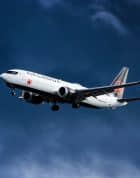After being closed to the rest of the world since the early days of the pandemic, Canada will finally be able to welcome foreign travellers into our borders once again.
The Government of Canada announced today that fully vaccinated US citizens and permanent residents will be able to enter Canada for discretionary travel as of August 9, 2021. Then, provided that Canada’s COVID-19 case counts remain low, fully vaccinated nationals of other foreign countries will be able to enter Canada as of September 7, 2021.
Borders Will Open to Fully Vaccinated Americans & Other Foreigners
On July 5, Canada loosened travel restrictions to allow fully vaccinated Canadian residents to return home without undergoing a mandatory 14-day quarantine. It was mentioned at the time that the next phase of loosening restrictions would involve opening up our borders to incoming foreign travellers who were fully vaccinated too.
Today, we’ve learned of a series of firm dates for these new measures: as of August 9, fully vaccinated US citizens and permanent residents who currently live in the US will be able to enter Canada (by air or by land) for the purpose of discretionary travel.
Then, on September 7, Canada intends to apply the same measure to all fully vaccinated foreign nationals who meet the regular entry requirements. This is subject to final confirmation depending on our domestic epidemiological situation – if there’s an uptick in COVID-19 cases, expect this measure to be pushed back.
To be considered fully vaccinated, travellers must have completed a full series (or mixed series) of Health Canada-approved vaccines – Pfizer, Moderna, AstraZeneca, or Johnson & Johnson – at least 14 days prior to their arrival in Canada. Borders remain closed to unvaccinated foreign nationals entering for the purpose of tourism.
As is the case with returning Canadian travellers, inbound American and other foreign travellers will need to present a negative COVID-19 PCR test within 72 hours of boarding their flight or arriving at the land border, as well as use the ArriveCAN app to submit their travel plans and proof of vaccination before arriving at the border.
Note that although Canada has announced its intention to open the land border to vaccinated US visitors, the US hasn’t declared the same just yet. It’s always been possible to fly to the US, but as things currently stand, the US land border will remain closed to Canadians who are crossing for non-essential purposes.

Hotel Quarantine Will End for All Travellers
Also as of August 9, Canada will abolish the much-maligned three-day hotel quarantine policy that has been in place since January 2021.
Currently, unvaccinated Canadian travellers returning to Canada by air must still undergo a three-day hotel quarantine at their own significant expense, followed by the remainder of their 14-day quarantine at home.
With the progress that Canada has been making on the vaccination front and the lower likelihood of community spread as a result, Canada will finally put this punitive policy to rest.
After August 9, unvaccinated Canadian travellers returning by air can simply head home to complete their mandatory 14-day quarantine, while fully vaccinated Canadians can skip the quarantine altogether (as they have since July 5).
The removal of the hotel quarantine also negates any need for returning Canadians to take a detour via the US and cross by land.
Canada’s hotel quarantine was a complete disaster from start to finish, driven by sentiment over science and marked by haphazard implementation across the board. It’s better late than never that it’s being abolished, and we won’t be sad to see it go.

New Post-Arrival Testing System
As Canada prepares to welcome an influx of travellers back into the country, a new post-arrival testing strategy will be implemented for fully vaccinated travellers.
Instead of requiring all fully vaccinated travellers to complete a test upon arriving in Canada, only a random selection of travellers will be required to undergo a test.
Unvaccinated travellers will still need to undergo test on Days 1 and 8 upon their return to Canada.

More Canadian Airports Will Open to International Flights
Since early 2021, inbound international flights have been limited to four Canadian airports: Vancouver, Calgary, Toronto Pearson, and Montreal.
With our borders opening to US travellers as of August 9, a handful more Canadian airports have now been given authorization to receive international flights:
- Edmonton International Airport
- Winnipeg James Armstrong Richardson International Airport
- Ottawa Macdonald–Cartier International Airport
- Québec City Jean Lesage International Airport
- Halifax Stanfield International Airport
For Canadians based near these airports, the inevitable return of direct transborder flights will make it easier to plan a round-trip getaway to the United States; meanwhile, Americans visiting Canada for the first time in 17 months will also have a wide range of choices in terms of which airport to fly into.
Is International Travel Well and Truly Back?
We’ve been inundated with good news in terms of travel recovery for several months running now. Can we now “call it” that travel is well and truly on its way back, or is it too early to say?
While things are certainly trending in the right direction here in Canada, the same isn’t necessarily true all around the world. Several countries are grappling with record-setting case numbers, primarily fuelled by the more transmissible Delta variant.
It’s interesting to note that unlike some other countries, Canada has not decided to open borders on September 7 to a select list of vaccinated foreign nationals coming from places with low infection rates; instead, all vaccinated foreign travellers are set to be welcomed to Canada as of that date.
However, the selective nature of the list of Health Canada-recognized vaccines effectively screens potential travellers on behalf of the border policy.
Pfizer, Moderna, AstraZeneca, and Johnson & Johnson vaccines appear to be more effective in protecting against new variants, and they’re also only widely available among the world’s wealthier countries, who are better-equipped to vaccinate their populations.
The global imbalance in vaccination rates and protection against variants will likely persist over the coming months.
On one hand, this allows Canada to open borders to some vaccinated international travellers without assuming too much risk in terms of domestic cases going back up.
On the other hand, even though we’re fortunate to be making good progress here in Canada, many countries around the world still face surging cases and a vaccine shortage. We can’t say that international travel is truly back until the global vaccination and recovery effort is further along.
Conclusion
In the latest step towards the full resumption of travel, Canada will welcome vaccinated US travellers into its borders starting on August 9, with all vaccinated international travellers to follow on September 7.
It’s a relief that Canada will soon be open to the world once again, with Canadians able to explore other countries and foreigners able to visit without onerous quarantine rules in place. An influx of foreign travellers also promises to give our own domestic travel industry a much-needed boost along the road to recovery.
Still, even though we as travellers are all looking forward to a return to normalcy, it’s important to harbour some caution. Even though things are very much moving in the right direction, new variants of the virus may yet give us a bumpy ride along the way.















So it sounds like you won’t need the covid test to get on the plane to come back to Canada?
From the article: “As is the case with returning Canadian travellers, inbound American and other foreign travellers will need to present a negative COVID-19 PCR test within 72 hours of boarding their flight or arriving at the land border”